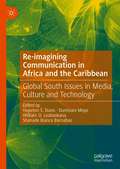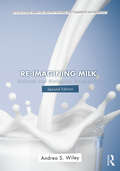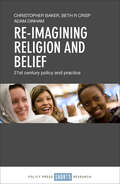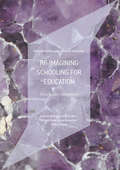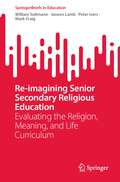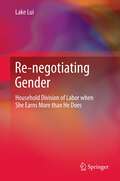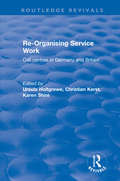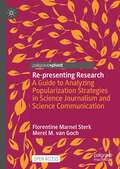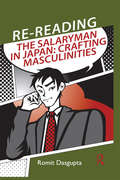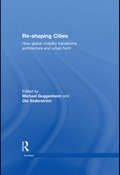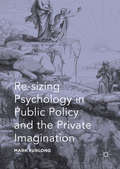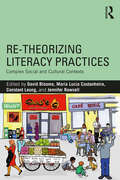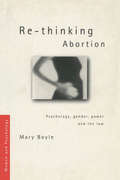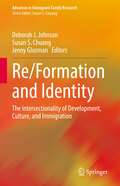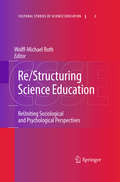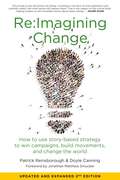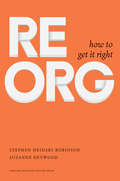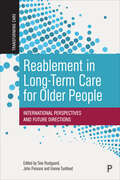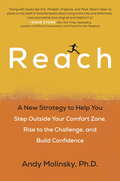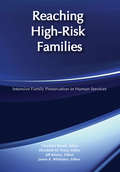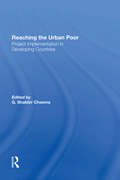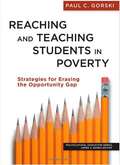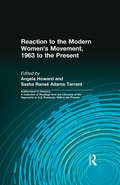- Table View
- List View
Re-imagining Communication in Africa and the Caribbean: Global South Issues in Media, Culture and Technology
by Hopeton S. Dunn Dumisani Moyo William O. Lesitaokana Shanade Bianca BarnabasThis book advances alternative approaches to understanding media, culture and technology in two vibrant regions of the Global South. Bringing together scholars from Africa and the Caribbean, it traverses the domains of communication theory, digital technology strategy, media practice reforms, and corporate and cultural renewal. The first section tackles research and technology with new conceptual thinking from the South. The book then looks at emerging approaches to community digital networks, online diaspora entertainment, and video gaming strategies. The volume then explores reforms in policy and professional practice, including in broadcast television, online newspapers, media philanthropy, and business news reporting. Its final section examines the role of village-based folk media, the power of popular music in political opposition, and new approaches to overcoming neo-colonial propaganda and external corporate hegemony. This book therefore engages critically with the central issues of how we communicate, produce, entertain, and build communities in 21st-century Africa and the Caribbean.
Re-imagining Milk: Cultural and Biological Perspectives (Routledge Series for Creative Teaching and Learning in Anthropology)
by Andrea S. WileyMilk is a fascinating food: it is produced by mothers of each mammalian species for consumption by nursing infants of that species, yet many humans drink the milk of another species (mostly cows) and they drink it throughout life. Thus we might expect that this dietary practice has some effects on human biology that are different from other foods. In Re-imagining Milk Wiley considers these, but also puts milk-drinking into a broader historical and cross-cultural context. In particular, she asks how dietary policies promoting milk came into being in the U.S., how they intersect with biological variation in milk digestion, how milk consumption is related to child growth, and how milk is currently undergoing globalizing processes that contribute to its status as a normative food for children (using India and China as examples). Wiley challenges the reader to re-evaluate their assumptions about cows' milk as a food for humans. Informed by both biological and social theory and data, Re-imagining Milk provides a biocultural analysis of this complex food and illustrates how a focus on a single commodity can illuminate aspects of human biology and culture.
Re-imagining Religion and Belief: 21st Century Policy and Practice
by Christopher Baker Beth R. CrispThe need to reimagine religion and belief is precipitated by their greater visibility in public life. Meanwhile, social policy responses often see them from a problem-based, rather than an asset-based, approach. However, with growing diversity of religion and belief in every sector comes the potential for new dialogues across previously impermeable policy and disciplinary silos. This volume brings together leading international authors to critically consider these challenges within legal and policy frameworks, including security and cohesion, welfare, law, health and social care, inequality, cohesion, extremism, migration and abuse. It challenges policy makers to re-imagine religion and belief as an integral part of public life that contains resources, practices, forms of knowledge and experience that are essential to a coherent policy approach to diversity, enhanced democracy and participation.
Re-imagining Schooling for Education
by Kitty Te Riele Debra Hayes Glenda Mcgregor Martin Mills Aspa BaroutsisThis book provokes a conversation about what supportive schooling contexts for both students and teachers might look like, and considers how schooling can contribute to a more socially-just society. It takes as its starting point the position of the most marginalised students, many of whom have either been rejected by or have rejected mainstream schooling, and argues that the experiences of these students suggest that it is time for schools to be reimagined for all young people. Utilizing both theory and data, the volume critiques many of the issues in conventional schools that work against education, and presents evidence 'from the field' in the form of data from unconventional schooling sites, which demonstrates some of the structural, relational, curricular and pedagogical changes that appear to be enabling schooling for education for their students. It will be essential reading for students and researchers in the fields of education, sociology and social work, and will also be of great interest to practising teachers.
Re-imagining Senior Secondary Religious Education: Evaluating the Religion, Meaning, and Life Curriculum (SpringerBriefs in Education)
by Mark Craig William Sultmann Janeen Lamb Peter IversThis book examines and reports the findings regarding the level of satisfaction by students, teachers and parents with an innovative senior secondary Religious Education curriculum ‘Religion, Meaning and Life’ (RML). The stimulus for RML is found in the changing profile of students within faith-based schools and the motivation of school authorities to be inclusive and responsive to changing needs and priorities of students and families. Curriculum practices typically mirror this continuing renewal as community expectations give rise to innovation in curriculum practice. This concept of continuity and discontinuity is evidenced in the field of Religious Education,, which recognizes religious plurality while giving preference to an imagination centred on inclusion, hospitality and respectful dialogue. In this context, new pathways are being explored as the reality and significance of Religious Education in faith-based school remain a priority for Christian organizations in Australia.Mindful of the diversity of expectations within the Catholic school, the curriculum initiative of RML was developed, supported and implemented. The La Salle Academy of the Australian Catholic University reviewed this senior secondary curriculum across three years and presents in this book an independent, evaluative report of the findings, together with insights for implementation at scale and associated applications across Christian faith-based institutions.
Re-membering Culture: Erasure and Renewal in Hmong American Education
by Bic NgoThe untold stories of resilience in Hmong American educationRe-membering Culture is a deep exploration of the intricate dynamics of cultural memory and education, centering the experiences of Hmong American students and educators. Arguing that the school, as a product of coloniality, perpetuates the marginalization and erasure of non-Western epistemologies, author Bic Ngo sheds light on the subtle yet impactful process of structured forgetting within the American education system. This politics of forgetting, in turn, contributes to the fragmentation of Hmong cultural heritage, identity, and community. Based on a high school in an urban center with a considerable Hmong immigrant community, Ngo&’s work draws on extensive ethnographic research with Hmong American community leaders, school administrators, parents, teachers, staff, and high school students to understand how they navigate the terrain of Western pedagogy while attempting to retain and preserve Hmong knowledge systems. Exploring a range of school experiences, Ngo traverses students&’ challenges in balancing school with family life and the everyday cultural racism encountered in the classroom as well as grassroots efforts to preserve culture, including the establishment of a Hmong Cultural Club. Highlighting these experiences and voices, Ngo provides a nuanced understanding of the challenges Hmong Americans face within an assimilationist society while contesting the dominant anti-immigrant narratives of refugee suffering and poverty. Through these practices of (re)storytelling, resurgence, and refusal, she underscores the agency of the Hmong American community, illuminating how the critical consciousness fostered by re-membering serves as a powerful tool in confronting white hegemonic ideologies in education. Retail e-book files for this title are screen-reader friendly.
Re-negotiating Gender
by Lake LuiIn Chinese societies where both "money" and "gender" confer power, can a woman's economic success relative to her husband's bring about a more equal division of household labor? Lui's qualitative study of "status-reversed" Hong Kong families, wherein wives earn more than their husbands, examines how couples re-negotiate household labor in ways that perpetuate male dominance within the family even when the traditional gender expectation that "men rule outside, women rule inside" (nanzhuwai, nuzhunei) is challenged. Going beyond the dyadic negotiation of household labor, this important study also explores the role of "third parties," namely the couples' children and parents, who actively encourage couples to conform to traditional gender norms, thereby reproducing an unequal division of household labor. Based upon the experiences of families with stay-at-home dads, Lui further identifies a new mechanism of deconstructing gender, by which couples concertedly construct new norms of "work" and "gender" that they maintain through daily interactions to fit their atypical relative earnings. As a result, there are sparks of hope that both men and women can be liberated from a set of traditional social norms. Re-negotiating Gender: Household Division of Labor When She Earns More than He Does is essential reading in the fields of family and gender studies, sociology, psychology, and East Asian studies.
Re-organising Service Work: Call Centres in Germany and Britain
by Ursula Holtgrewe Karen A. Shire Christian KerstThis title was first published in 2002. Call centres are a type of service work that stand at the interface between corporations and consumers. They exemplify more general tendencies present within service work. They also have a particular public image - being associated in the public mind with low skilled and regimented work. This volume presents contributions from British and German management academics and industrial sociologists based on primary research on call centres in both countries. The contributions cover the genesis and development of call centres as a new form of organization, or indeed a new industry; the rationalization and control strategies of organizations that establish call centres; and the nature of service work and service interactions. The findings of this volume challenge the common public image of call centres and finds that call centre employment is in fact very diverse. So, for example, skilled advising and consulting services are often performed over the phone. Along with the sometimes skilled nature of call centre work, work organization and working conditions vary as well. The text also seeks to contrast the British and German experience of call centre work and employment. In Germany clerical work has traditionally been embedded in the specific traditions of co-operative industrial relations that define the German model. Call centres present a strategic challenge to this model, and the expansion of call centres has been at the forefront of changes aimed at making employment more flexible in Germany. This work offers a choice of country cases, which permit a comparison of service employment within both a liberal capitalist and a socially embedded economy.
Re-positioning Accent Attitude in the Global Englishes Paradigm: A Critical Phenomenological Case Study in the Chinese Context (Routledge Studies in Sociolinguistics)
by Fan (Gabriel) FangThis book revisits the issue of China English as a developing variety of English and scrutinises students’ and teachers’ attitudes towards their own and other English accents from the critical phenomenological perspective of Global Englishes (GE) in the Chinese context. The research contributes to the field of GE by proposing a model of pronunciation teaching called ToPIC (Teaching of Pronunciation for Intercultural Communication) informed by interculturally responsive language pedagogy. Combining theory and empirical data, the book presents ground-breaking research on accent attitudes in the Chinese context within the GE paradigm and raises issues and concerns regarding teaching English, particularly speaking and pronunciation, from the GE perspective. Unpacking attitudes towards English accents from a critical perspective, this book will both show policy makers the need to consider the impacts of GE and help practitioners and language learners re-evaluate the goals and needs of English learning. The ToPIC approach also has significance for curriculum reform as it readdresses various issues in language policy and practice. The ToPIC approach is recommended for those interested in teaching and learning English in the expanding circle context and those seeking to learn more about learning and using English across the world.
Re-presenting Research: A Guide to Analyzing Popularization Strategies in Science Journalism and Science Communication
by Florentine Marnel Sterk Merel M. van GochThis open access book focuses on the textual features, or ‘strategies’, which form popularization discourse. In popularization discourse, research findings from academia are re-presented to make them noteworthy to society and influential for everyday life. Popularization involves recontextualization, or reimagination of findings in an everyday and newsworthy context, and reformulation, the use of audience-appropriate language to increase text comprehension and engagement. ‘Re-presenting research’ presents an empirically grounded, analytic framework for the analysis of popularization texts. Its applicability spans across disciplinary, multidisciplinary, and interdisciplinary fields, and overarches science communication, science journalism, and research communication. The book offers theoretical background information on popularization discourse, empirical underpinning of the construction of the framework, and practical applicability in examples from multiple text types and academic fields. This book acts as a guide for those working with or on popularization discourse – whether it is to analyze it or learn about it.
Re-reading the Salaryman in Japan: Crafting Masculinities (Routledge/Asian Studies Association of Australia (ASAA) East Asian Series)
by Romit DasguptaIn Japan, the figure of the suited, white-collar office worker or business executive ‘salaryman’ (or, sarariiman), came to be associated with Japan’s economic transformation following World War Two. The ubiquitous salaryman came to signify both Japanese masculinity, and Japanese corporate culture, and in this sense, the salaryman embodied ‘the archetypal citizen’. This book uses the figure of the salaryman to explore masculinity in Japan by examining the salaryman as a gendered construct. Whilst there is a considerable body of literature on Japanese corporate culture and a growing acknowledgement of the role of gender, until now the focus has been almost exclusively on women in the workplace. In contrast, this book is one of the first to focus on the men within Japanese corporate culture through a gendered lens. Not only does this add to the emerging literature on masculinity in Japan, but given the important role Japanese corporate culture has played in Japan’s emergence as an industrial power, Romit Dasgupta’s research offers a new way of looking both at Japanese business culture, and more generally at important changes in Japanese society in recent years. Based on intensive interviews carried out with young male private sector employees in Japan, this book makes an important contribution to the study of masculinity and Japanese corporate culture, in addition to providing an insight into Japanese culture more generally. As such it will be of great interest to students and scholars of Japanese studies, Japanese society and gender studies.
Re-shaping Cities: How Global Mobility Transforms Architecture and Urban Form (Architext)
by Ola Söderström Michael GuggenheimThis original collection examines how architectural ideas, social models and building forms circulate round the world and become mediated and adapted to local conditions. The book shows how types such as skyscrapers, mosques or living history museums are imported, adapted and contested in different societies and how urban landscapes are reshaped by the global circulation of models drawn from elsewhere. Written by scholars from different disciplinary backgrounds –architecture, anthropology, geography, linguistics, science studies and sociology – the book draws its inspiration from a series of different approaches and offers both original theoretical reflection and carefully crafted case-studies.
Re-sizing Psychology in Public Policy and the Private Imagination
by Mark FurlongThis book interrogates the current reputation of Psychology, both as an industry and as part of the academy. It disputes Psychology's claim to be a science, questions its claims to effectiveness and examines relationships with other disciplines and fields. Just as Psychology's role in the design of addictive gaming machines has been underplayed so too has the conservative aspect of its regulation of normality and pathology. The discipline of Psychology affects our understanding of identity and subjectivity to position the self as amoral and disconnected. This book questions this assumption and, more generally, the received status of Psychology.
Re-theorizing Literacy Practices: Complex Social and Cultural Contexts
by Constant Leung Jennifer Rowsell David Bloome Maria Lucia CastanheiraMoving beyond current theories on literacy practices, this edited collection sheds new light on the complexities inherent to the social, cultural, and ideological contexts in which literacy practices are realized. Building on Brian V. Street’s scholarship, contributors discuss literacy as intrinsically social and ideological, and examine how the theorizing of literacy practices has evolved in recognition of the diverse contexts in which written language is used. Breaking new intellectual and theoretical ground, this book brings together leading literacy scholars to re-examine how educational and sociocultural contexts frame and define literacy events and practices. Drawing from the richness of Brian V. Street’s work, this volume offers insights into fractures, tensions, and developments in literacy for scholars, students, and researchers.
Re-thinking Abortion: Psychology, Gender and the Law (Women and Psychology)
by Mary BoyleWomen have been able to have abortions legally for over 30 years. Yet few books have considered it as anything other than a health issue. Mary Boyle breaks this mould by considering the constructions of abortion in Western society. Drawing on ideas from sociology, politics, anthropology and law as well as psychology, she shows how abortion is linked to sexual behaviour and motherhood in the complex web of gender and power relations.This book will be of interest to all those engaged with feminist thinking, whether as student, academic, or professional in practice.
Re/Formation and Identity: The Intersectionality of Development, Culture, and Immigration (Advances in Immigrant Family Research)
by Susan S. Chuang Deborah J. Johnson Jenny GlozmanThis innovative book applies contemporary and emergent theories of identity formation to timely questions of identity re/formation and development in immigrant families across diverse ethnicities and age groups. Researchers from across the globe examine the ways in which immigrants from Africa, Asia, Europe, and Latin America dynamically adjust, adapt, and resist aspects of their identities in their host countries as a form of resilience. The book provides a multidisciplinary approach to studying the multidimensional complexities of identity development and immigration and offers critical insights on the experiences of immigrant families. Key areas of coverage include: Factors that affect identity formation, readjustment, and maintenance, including individual differences and social environments. Influences of intersecting immigrant ecologies such as family, community, and complex multidimensions of culture on identity development. Current identity theories and their effectiveness at addressing issues of ethnicity, culture, and immigration. Research challenges to studying various forms of identity. Re/Formation and Identity: The Intersectionality of Development, Culture, and Immigration is an essential resource for researchers, professors, and graduate students as well as clinicians, professionals, and policymakers in the fields of developmental, social, and cross-cultural psychology, parenting and family studies, social work, and all interrelated disciplines.
Re/Structuring Science Education
by Wolff-Michael RothSince its beginnings, science education has been under the influence of psychological theories of knowing and learning, while in more recent years, social constructivist and sociological frameworks have also begun to emerge. With little work being done on showing how the perspectives of these separate approaches might be integrated, this work aims to plug the gap. The book helps lay the groundwork for reuniting sociological and psychological perspectives on the knowing, learning, and teaching of science. Featuring a range of integrative efforts beginning with simple conversation, the chapters here include not only articles but also commentaries that engage with other papers, as well as a useful running narrative that, from the introduction to the epilogue, contextualizes the book and its sections. Specific attention is given to cultural-historical activity theory, which already offers an integration of psychological and cultural-historical (sociological) perspectives on collectively motivated human activities. A number of chapters, as well as the contextualizing narrative, explicitly use this theory as a framework for rethinking science education to achieve the reunification that is the goal of this work. All the contributors to this volume have produced texts that contribute to the effort of overcoming the extant divide between sociological and psychological approaches to science education research and practice. From very different positions--gender, culture, race--they provide valuable insights to reuniting approaches in both theory and method in the field. As an ensemble, the contributions constitute a rich menu of ideas from which new forms of science education can emerge.
Re: How to Use Story-based Strategy to Win Campaigns, Build Movements and Change the World
by Doyle Canning Patrick ReinsboroughThis unique book explores how culture, media, memes and narrative intertwine with social change strategies, and offers practical methods to amplify progressive causes in the popular culture.
ReOrg: How to Get It Right
by Suzanne Heywood Stephen Heidari-RobinsonA Practical Guide in Five StepsMost executives will lead or be a part of a reorganization effort (a reorg) at some point in their careers. And with good reason-reorgs are one of the best ways for companies to unlock latent value, especially in a changing business environment.But everyone hates them.No other management practice creates more anxiety and fear among employees or does more to distract them from their day-to-day jobs. As a result, reorgs can be incredibly expensive in terms of senior-management time and attention, and most of them fail on multiple dimensions. It's no wonder companies treat a reorg as a mysterious process and outsource it to people who don't understand the business. It doesn't have to be this way.Stephen Heidari-Robinson and Suzanne Heywood, former leaders in McKinsey's Organization Practice, present a practical guide for successfully planning and implementing a reorg in five steps-demystifying and accelerating the process at the same time. Based on their twenty-five years of combined experience managing reorgs and on McKinsey research with over 2,500 executives involved in them, the authors distill what they and their McKinsey colleagues have been practicing as an "art" into a "science" that executives can replicate-in companies or business units large or small. It isn't rocket science and it isn't bogged down by a lot of organizational theory: the five steps give people a simple, logical process to follow, making it easier for everyone-both the leaders and the employees who ultimately determine a reorg's success or failure-to commit themselves to and succeed in the new organization.
Reablement in Long-Term Care for Older People: International Perspectives and Future Directions (Transforming Care)
by Tine Rostgaard, John Parsons, and Hanne TuntlandOur societies are ageing, and we need to identify sustainable and person-centred solutions for supporting frail older people in their homes. Reablement offers a radical new integrated care approach which supports older people to regain and maintain functioning and independence. This interdisciplinary book provides an introduction to the remarkable, if haphazard, international growth in reablement policies and practices in aged care over the past 20 years. Incorporating theoretical and empirical research, it considers benefits for clients and care workers, cost-saving potentials and reablement provision for people with dementia. Finally, the book reflects on key findings, challenges and the way forward for long-term care for older people.
Reach: A New Strategy to Help You Step Outside Your Comfort Zone, Rise to the Challenge , and Build Confidence
by Andy MolinskyDo you feel comfortable delivering bad news? Do you look forward to speaking in public? Do you enjoy networking? Is it easy for you to speak your mind and be assertive with friends and colleagues? If you answered no to any of these questions, this book can help! What often sets successful people apart is their willingness to do things most of us fear. What’s more, we have the false notion that successful people like to do these things, when the truth is that successful people have simply found their own way to do them.According to Andy Molinsky, an expert on behavior in the business world, there are five key challenges underlying our avoidance tendencies: authenticity, competence, resentment, likability, and morality. Does the new behavior you’re attempting feel authentic to you? Is it the right thing to do? Answering these questions will help identify the “gap” in our behavioral style that we can then bridge by using the three C’s: Clarity, Conviction, and Customization. Perhaps most interesting, Molinsky has discovered that many people who confront what they were avoiding come to realize that they actually enjoy it, and can even be good at it.Short, prescriptive, and based not only on the author’s groundbreaking research but on his own quest to get out of his comfort zone, Reach will help you take the thing you are most afraid of doing and make it a proud part of your personal repertoire.
Reaching High-Risk Families: Intensive Family Preservation in Human Services - Modern Applications of Social Work (Modern Applications Of Social Work Ser.)
by Elizabeth TracyFocusing on a program (""Homebuilders"") that has attracted national attention, this book develops implications for family-centered curricula in such areas as social policy, direct practice, program design/management, practice research, theory and prevention.
Reaching The Urban Poor: Project Implementation In Developing Countries
by G. Shabbir Cheema G Shabbir CheemaAs urban populatiCC'lS in developing countries oootinue to grow rapidly, cne of the nest critical issues in the Third W:lrld has beoane p:rovidirYJ shelter and other basic services such as clean water, heal th clinics, and sewage disposal to the urban poor. This book of nine case studies of urban programs and projects in Ind:oesia, Kenya, Malaysia, Nigeria, Pakistan, South Korea, India, and Sri Lanka focuses en impediments to slum upgrading. The authour discuss each project's evoluticn, the capabilities and resources of inplenenting agencies, the problems of interagency relaticoships and coordinaticn, costs and funding, the difficulties of developing effective linkages with poor cx:mnunities, and the accessibility of the new services to the urban poor.
Reaching and Teaching Students in Poverty: Strategies for Erasing the Opportunity Gap (Multicultural Education Series)
by Paul C. GorskiThe author draws from decades of research to deconstruct popular myths, misconceptions, and educational practices that undercut the achievement of low-income students. Gorski carefully describes the challenges that students in poverty face and the resiliencies they and their families draw upon. This book provides specific, evidence-based strategies for teaching youth by creating equitable, bias-free learning environments. This resource will help teachers and school leaders to better reach and teach students in poverty.
Reaction to the Modern Women's Movement, 1963 to the Present (Antifeminism In America: A Collection Of Readings From The Literature Of The Opponents To U. S. Feminism, 1848 To The Present Ser. #3)
by Angela Howard Sasha Ranaé Adams TarrantAntifeminism in cultural context To give today's readers an understanding of the social and political forces that actively fought against any changes in women's status in the United States, the editors selected these original examples from the writings of the time that appeared in popular books and magazines. Opponents of women's equality frequently voiced their opinions about 19th-century issues of women's suffrage, dress reform, self-expression, independence, and other topics that touched upon the perceived roles and duties of women. Such public diatribes continued into the 10th century as determined antifeminists argued against increased opportunities for women in employment and education, denied the propriety of family planning, and admonished against women's involvement in politics. Arguments based on ridicule, natural law, and false claims Some opponents merely dismissed or ridiculed calls for changes in women's status, without specifying particular flaws in the feminist position. Others cited divine ordination, applied to natural law, and fanned public fears of familial and social disintegration. Frequently these critics resorted to charges of presumed lesbianism, communism, and socialism against advocates of women's rights and against the movement itself. This adamant opposition to equality for women was a manifestation of common apprehension about ongoing social, economic, and political changes beyond antifeminist control. Antifeminists in their own words Today few people have even an inkling of the vehemence, theatrical posturing, and convoluted reasoning of the antifeminist forces. This varied selection of original sources puts an illuminating spotlight on the arguments presented by opponents of women's equality that is drawn from an extensive body of writings, ranging from the elegant pronouncements of a popular politician to sincere endorsements of the status quo by female apologists for those opposed to the women's movement, to purveyors of low satire in the popular press. For modern readers, this collection provides the opportunity to encounter directly the reasoning, opinions, and perceptions of those that resisted and criticized the goals and achievements of feminism. A valuable resource for many disciplines. A particularly valuable feature of this set is its wealth of primary source material from the 19th and early 20th centuries, including material from books and newspapers. Very few libraries have collected these sources and chances are no single collection has them all. These volumes are of great interest to women's studies, women's history, gender studies, cultural studies, as well as history, political science, sociology, and literature. Many of the examples of antifeminist writing found in the set can enrich classroom discussions and assignments that involve communication, writing, and rhetoric. Available individually by volume 1. Opposition to the Women's Movement in the United States, 1848-1929 (0-8153-2713-7) 400 pages 2. Redefining the New Woman, 1920-1963 (0-8153-2714-5) 344 pages 3. Reaction to the Modern Women's Movement, 1963 to the Present (0-8153-2715-3) 352 pages
